93 Search Results for mini schedule
May 14, 2015
by Carole Zangari -

I am constantly in awe of the creativity and generosity of AAC practitioners, particularly those like Tabi Jones-Wohleber who make fabulous materials and share them with colleagues that they’ve never even met. Tabi is an SLP on the AT Team for Frederick County Public Schools in Maryland. A graduate of Penn State University, her career has focused on AAC. Though she works with many schools and addresses a variety of AT needs, most of her time and creative energy is devoted to working with students with the most significant disabilities. In this post, she introduces us to the All-in-One-Visual-Support Tool. You wont want to miss Tabi’s treasure trove of prAACtical materials. :::::::::::::::::::::::::::::::::::::::::::::::::::::::::::::::::::::::::::::::::::: It was a conversation I’d had many times before. A conversation that kept resurfacing in one form or another. It’s the conversation of how to manage all the stuff; all the visuals, all the reinforcers, all the communication tools. The benefit of visual supports to... [Read More...]
July 10, 2014
by Carole Zangari -
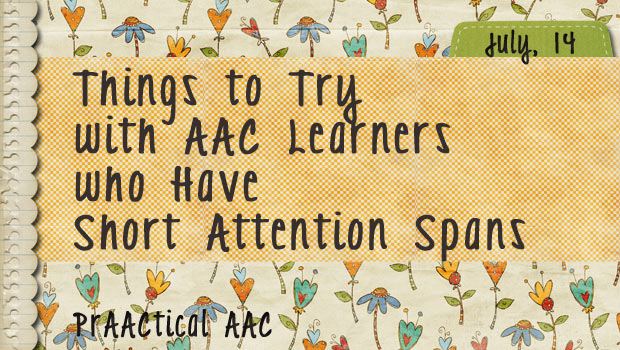
We love talking to AAC practitioners, hearing their stories, and picking up some tips along the way. Some conversations we love for the creative ideas or underlying passion. Others are memorable for less positive reasons. But still, they give us pause and challenge us to be better problem-solvers. “I love those ideas, but they won’t work with MY client: He doesn’t pay attention. He’s just not ready for all this. How do you expect me to teach someone with such a short attention span?” Glad you asked! First, don’t blame the learner. Like having short legs or frizzy hair, attention span is something over which some learners have little or no control. Their physiology is their physiology and they may not like it any more than we do. Use high-interest components in your therapy. The goals are the goals, but we can use things the client likes to make working on... [Read More...]
November 30, 2013
by Robin Parker -
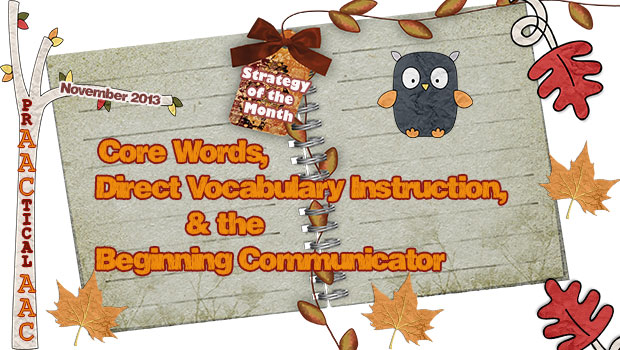
Direct vocabulary instruction is important for all level learners. The beginning communicator needs to learn core word vocabulary from USING the words and one of the best ways to learn how to USE core words, is to receive specific direct instruction with many opportunities for active participation. 6 Essential Philosophies & Strategies Vocabulary instruction involves a systematic TEACHING process. Add vocabulary or Words as an activity on the daily schedule and then have a mini-schedule for the specific vocabulary instruction activities for that day. Initially, apply an errorless learning paradigm. Then, gradually, add comprehension checks, but do not wait for ‘proof’ of comprehension before adding new words because we often notice that the beginning communicator will demonstrate comprehension during ‘unexpected opportunities- or when you are least expecting it. Once learners become familiar with some of the specific vocabulary activities, then have some choice making opportunities as to which ‘word activities’... [Read More...]
November 6, 2013
by Carole Zangari -
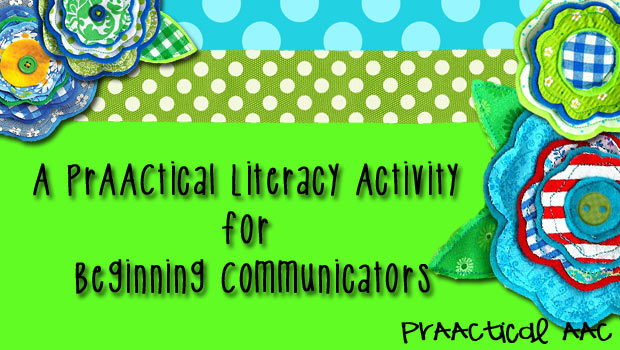
We’ve been having a great time supporting beginning communicators and gently modeling how they can be involved in literacy learning activities. In this post, we share a super simple activity to build alphabet knowledge and letter-sound correspondence. It has worked well (or fairly well) for beginning communicators who: Are just learning to establish cause-effect relationships Have little interest in existing classroom alphabet activities Are verbal, but reluctantly Are reluctant participants in group activities and seem to prefer being alone Have no formal AAC system, but would benefit from one Treat books and other printed materials as objects to spin, rip, or throw Have not been given the opportunity to participate in traditional literacy instruction. We love it because: It is is quick and easy. It requires almost no advance planning other than having a camera (or one on your phone/mobile device) Other people in the classroom notice us doing real... [Read More...]
October 24, 2013
by Robin Parker -

Cooking is a great activity as the platform for meaningful language experiences for both children and adults. Halloween often involves candy and tasty treats. However, there are also plenty of healthy Halloween foods (e.g., carrot pumpkins, tangerine & celery pumpkins, or apple teeth to name just a few). Then comes Thanksgiving and all the recipes that go along with it (e.g., lots of opportunity for repetition with variety). Everyone can be involved with cooking, although just because you cook doesn’t mean you need a stove. From spooky chex mix to more elaborate cookie and cake decorations, there is a ton of active participation and conversation that can be incorporated into cooking. And the fun and rewards (eating) are built-in. Although there are plenty of Halloween recipes, many recipes can be turned ‘spooky’ with an addition/modification of Halloween shapes or colors. You can cook using core words and/or focusing on the... [Read More...]
October 12, 2013
by Robin Parker -
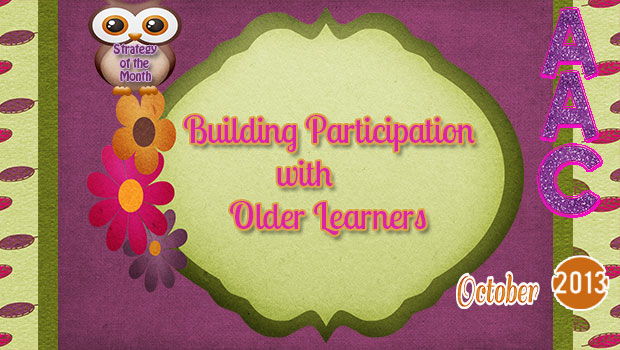
We love active participation for communication and language learning. Actually, we love active participation in all areas of life for us, for our students, for everyone. When Carole introduced the Building Participation Strategy of the Month, she discussed the role of the Participation Model (Beukelman & Mirenda, 1988; 2013). The Participation Model is a framework for understanding the barriers to participation and then from a prAACtical intervention standpoint developing strategies and activities to increase active participation in a variety of (ALL) aspects of life. For the 2012 AAC Awareness Month, we discussed barriers to participation. This year’s focus is on activities and strategies for getting past the barriers to building age appropriate authentic active participation for ALL learners. We have learned that when older learners with significant communication challenges are provided with age appropriate activities and supports, they can be engaged and motivated to participate and can often surprise us with... [Read More...]
October 4, 2013
by Robin Parker -
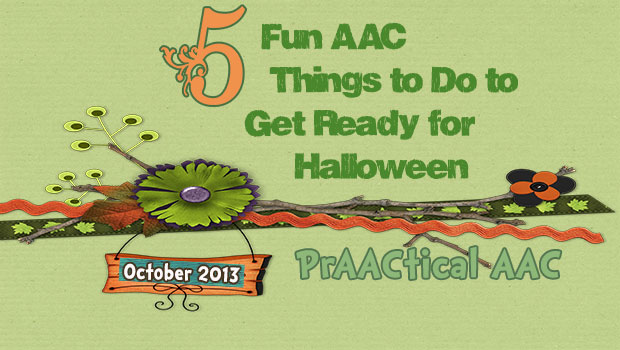
We love to start planning for holidays early. It helps facilitate conversation before, during, & after exciting activities and events. When we begin using core and fringe vocabulary early, frequently, and authentically the learner has the most opportunity for success. Use Schedules: Use a monthly calendar to have a Halloween countdown, Use mini-schedules to make food recipes, spooky science concoctions, or even to plan the trick or treating routes. Use a small talk app like Fat Cat Spooky Chat to prAACtice what you will SAY (October core words) on Halloween. Use a social narrative to prepare everyone for what to expect on and around Halloween. More Halloween social narratives can be found at Autism Community, One Place for Special Needs, Katherine Sanger You Tube, & Kentucky Autism Training Center Prepare a choice board of Halloween costume options and let the learner decide on the costume. PrAACtice a script to be... [Read More...]
September 12, 2013
by Robin Parker -
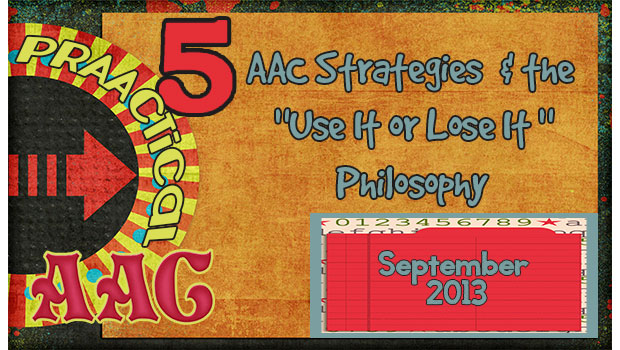
School has begun for almost everyone. Some classes have been in session for a while and routines have been formed, learning is taking place, behaviors have settled down. Now comes what can seem like the hard part: Keeping up with and expanding the strategies that helped students become successful. Instead of trying to fade AAC displays/devices and visual supports, stick with the basics and expand how they can be used. Because if you don’t use it, you may lose it. So: Keep up with: Visual Schedules– monthly, daily, and mini. Even if students know the schedule, continue to use it. Most of us would not like ‘losing’ our day planner or ‘to do’ lists even though we know our schedules. Aided Language Input First- Then Visual Support Visual Boundaries Access to a AAC Display/Device– And the display or device is with the student All the time, everywhere, charged, working, and... [Read More...]
August 10, 2013
by Robin Parker -
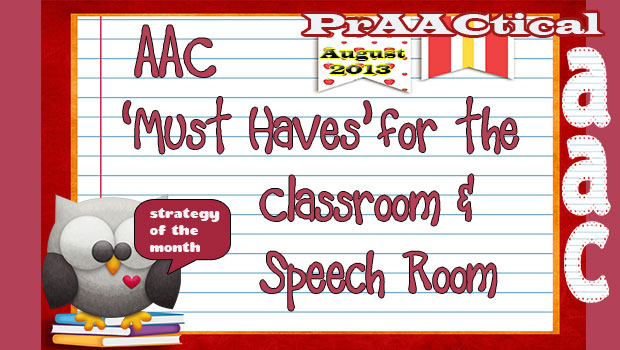
As we were getting ready for back to school and thinking about ‘must haves’, it quickly became apparent that it is not so easy to narrow it down. And the ‘must haves’ would definitely vary depending upon type of class, students, and even school. Based on a wide variety of differences, we organized a wide variety of choices to explore (we apologize in advance if we got carried away but…). Choose what you need, bookmark what you may need later and let us know your ‘must haves’ for a classroom and speech room AAC collaborative approach. We will create an ongoing list. Get Started Before School Starts Do these 10 Things to Get Started with AAC if you are new to an AAC student or classroom Provide AAC Support in the Classroom. Support teachers and educators with tips from Jane Farrall, & learn about AAC in the Classroom by Joan... [Read More...]
August 3, 2013
by Carole Zangari -
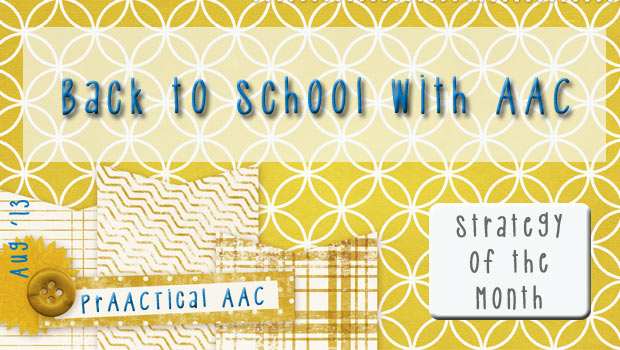
Here in the US, August is Back-to-School month. Throughout this month, we’ll try to post ideas and resources to help make the transition back to school a smooth and successful one. One of the most important things for students who use AAC is having their SLPs, teachers, and families on the same page. They each have a different but very intense relationship with the student’s AAC system. Here are some prAACtical thoughts on getting everyone on the same page. 1. Develop a communication profile of the student: In the initial weeks, try to get a baseline of how the student is communicating at the start of the year. For beginning communicators, we track things like their communicative intents (WHY they are communicating), modalities (HOW they are communicating), and the frequency of their communication. We’ve written about one of our favorite tools for this, the Communication Matrix. 2. Share what you know:... [Read More...]









